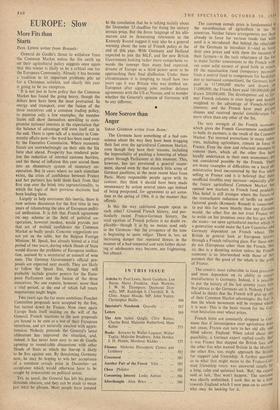EUROPE: Slow
More Fits than 'Starts
PAUL LEWIS writes from Brussels:
General de Gaulle's threat to withdraw from the Common Market unless the Six catch up on"their agricultural policy suggests once again that this winter is likely to be a critical one for the European Community. Already it has become a tradition to let important problems pile up for a Christmas solution, and clearly this year is going to be no exception.
' It is not just in farm policy that the Common Market has found the going heavy, though the delays here have been the most protracted. In energy and transport, over the fusion of the three executives and a common trading policy, to mention only a few examples, the member States still show themselves unwilling to com- promise national interests in the expectation that the balance of advantage will even itself out in the end. There is open talk of a malaise in Com- munity affairs now—the word has been used even by the Executive Commission. Where economic forces are overwhelmingly on their side the Six have shot ahead. Prosperity has rendered pain- less the reduction of internal customs barriers, and the threat of inflation this year scared them into an elementary system of monetary co- operation. But in cases where no such stimulant exists, the crisis of confidence between France and her partners has held them back from that first step over the brink into supranationality, to which the logic of their previous deciSions had been leading them.
Largely to help overcome, this inertia, there is now serious discussion for the first time in two years of relaunching the idea of European politi- cal unification. It is felt that French agreement on any scheme in the field of political co- operation, however. modest, would provide just that act of mutual confidence the Common Market so badly needs. Concrete suggestions are not yet on the table, but the Belgian Foreign Minister, M. Spaak, has already hinted at a trial period of two years, during which Heads of State would discuss the problems of European unifica- tion, assisted by a secretariat or council of wise men. The German Government's official pro- posals are expected next month. They are likely to follow the Spaak line, though they will probably include greater powers for the Euro- pean Parliament and the fusion of the three executives. No one expects, however, more than a trial period, at the end of which full treaty negotiations might begin.
Two years ago the far more ambitious Fouchet Committee proposals were accepted by the five, but turned down by France. Now once again Europe finds itself waiting on the will of the General. French reactions to the new proposals are bound to be seen as a test of their European intentions, and are naturally awaited with appre- hension. Nobody pretends the General's latest ultimatum has improved the situation, and, indeed, it has never been easy to see de Gaulle agreeing to round-table discussions with other Heads of State at which the line-up is likely to be five against one. By threatening Germany now, he may be hoping to win her acceptance of a common cereals price in December—an acceptance which would otherwise have to be sought by concessions on political union.
Yet, as usual, the General has left his precise demands obscure, and they can be made to mean just what he pleases. Most people have jumped
to the conclusion that he is talking mainly about the December 15 deadline for fixing the unitary cereals price. But the fierce language of his ulti- matum and its threatening references to the Kennedy Round suggest it may also be a general warning about the tone of French policy at the end of this year. With Germany and Holland expected to join the MLF, and the new British Government looking rather more sympathetic to- wards the concept than many had expected, dreams of Europe as a third power seem to be approaching their final disillusion. Under these circumstances it is tempting to recall how two years ago it was Britain who was dubbed un- European after signing joint nuclear defence agreements with the US at Nassau, and to wonder whether the General's opinion of Germany will be any different.


































 Previous page
Previous page